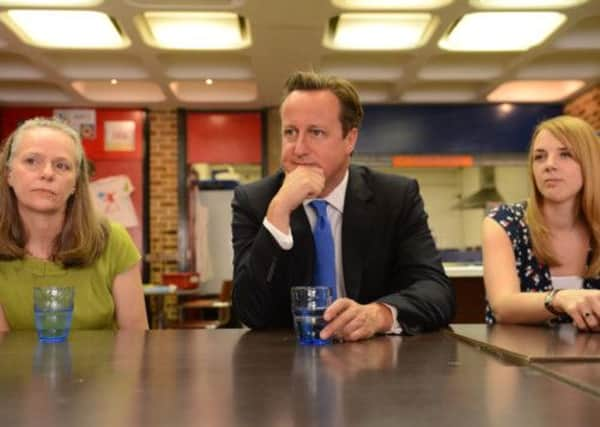Hugh McLachlan: Porn ban arguments fail to convince


In SCOTLAND, the possession of images of simulated rape is a crime. David Cameron has proposed to bring the UK into line with Scotland in this respect, in addition to making other proposals – vague and specific – to tighten the laws concerning pornography. It is not clear that this is wise.
It was the view of Bertrand Russell that “there ought to be no law whatsoever on the subject of obscene publications”. Such legislation fails to do the good things which its proposers expect it to do while, predictably, it produces unintended bad effects.
Advertisement
Hide AdAdvertisement
Hide AdRussell argued that, as a matter of fact, the legislation that existed in his day which rendered pornography illegal had more effect on the suppression of literary and academic material than it did on the suppression of pornography.
There is, clearly, some sense in this argument. The publication of some literary or academic material might lead to needless prosecution. Even more importantly, through fear of or respect for the law, people might well be deterred from publishing, writing, reading or looking at things that should not be suppressed.
For instance, we know far less than might be known about the nature and effects of some sorts of pornography because serious scholars are wary of studying such material. They face the possibility of the sack and jail if they do. They risk loss of reputation through the imputation that their interest in the material is other than academic.
Those who have no respect for or fear of the law are unlikely to be deterred from producing and selling pornography by it being made illegal. On the contrary, they might welcome it. As with, say, alcohol and drugs, the price at which pornography can be sold and the profit that can be made from its production and sale rises with its illegality.
It seems arbitrary to say, for instance, that one should be permitted to watch Straw Dogs in a cinema with its scenes of rape performed by respected professional actors but not to watch on one’s computer a film shot in someone’s garage with unknown performers that has a rape scene in it.
It seems arbitrary to say that one should be permitted to gaze at a painting of rape in an art gallery and to read a report of an actual rape and to read a fictionalised account of rape but not to look at a photograph or a film of a real or simulated rape.
If we want to draw a legal line, where should we draw it? Why should we draw it?
One might agree to an extent with Russell yet think there are some sorts of pornography that should be illegal. In particular, some pornography appears to be the filming or photographing of actual crimes such as rape and child abuse. On the basis of invasion of privacy alone, there are clear objections to the production and dissemination of such images.
Advertisement
Hide AdAdvertisement
Hide AdHowever, in general, it is not a crime to look at, watch or distribute photographs or films of actual crimes. Hence, we must be careful if we want to argue that it should be a crime to do so in some particular instances. After all, we buy newspapers that have photographs of actual crimes such as, say, terrorist atrocities. We watch footage of such actual crimes on the television.
Terrorists crave publicity. If people refused to buy newspapers that carried such photographs and refused to watch television programmes that showed such footage, it is reasonable to assume that there might be fewer terrorist atrocities. However, we do not normally argue that it should be, on these grounds, a crime to publish or possess images of terrorist crimes.
It is not clear to what extent the purchase, far less the mere possession, of an image of rape or child abuse provokes actual rape and child abuse. However, those who watch footage of and look at images of terrorism would need to be cautious when condemning the perusal of pornography on the grounds of its alleged effect of promoting criminal acts.
It is sometimes suggested that people are provoked by looking at images of rape and child abuse into committing similar acts themselves. Even if this assertion is true, it is not clear that it would justify making it a criminal offence to produce, distribute or possess such material.
Some people might be provoked to attack women sexually by the sight of a woman in a bikini or short skirt. It does not follow that it should be a criminal offence to wear a bikini or a short skirt. It does not follow that people in general should be forbidden to look at women in bikinis or short skirts.
If some people commit crimes as a result of watching pornography, such people are, manifestly, a problem. It is not obvious that pornography is thereby a problem. It is not obvious that no-one should be allowed to look at pornography because of what some people choose to do after watching it.
Suppose we discovered that some terrorists were interested in looking at footage of the destruction of the Twin Towers. We are unlikely to say this is a good reason for suggesting that no-one should be allowed to produce, distribute or possess such images.
Why, then, should we make a similar suggestion with regard to pornography?
Advertisement
Hide AdAdvertisement
Hide AdActions should remain legal until and unless a justification can be given for making them crimes. The onus is not on Russell and those who oppose laws against pornography to justify their position. It behoves the banners to justify the ban. Hitherto, the suggested justifications have tended to be weak.
• Hugh McLachlan is Professor of Applied Philosophy in the Glasgow School for Business and Society at Glasgow Caledonian University